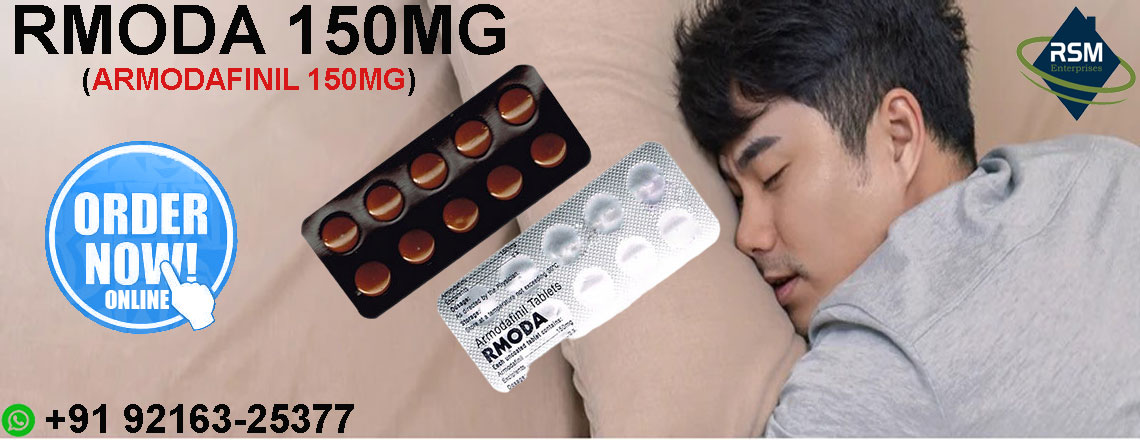Narcolepsy is a neurological (sensory system) illness that influences the brain's capacity to control sleep and alertness. If you have narcolepsy, you experience extreme daytime tiredness and may have uncontrollable episodes of nodding off during the daytime. These abrupt sleep assaults may happen during a movement and whenever of the day. Rmoda 150 is an attentiveness-promoting specialist. It comprises Armodafinil 150mg as an active salt.
Who gets narcolepsy?
Around one of every 2,000 Americans has narcolepsy. The issue influences guys and females similarly. Up to 10% of individuals who have narcolepsy have a relative who likewise has the issue. Narcolepsy happens in individuals, everything being equal, yet the principal indication of daytime drowsiness generally appears in the high school years or twenties. Since narcolepsy's side effects mimic gloom, other sleep issues, or different sicknesses, it might go undiscovered and untreated for a long time.
What causes narcolepsy
Narcolepsy is often brought about by an absence of the synthetic brain hypocretin (otherwise called orexin), which controls attentiveness. The absence of hypocretin is believed to be brought about by the insusceptible system erroneously going after the cells that produce it or the receptors that permit it to work. Yet, this doesn't explain all instances of narcolepsy, and the specific reason for the issue is frequently hazy.
Things that have been proposed as potential triggers of narcolepsy include:
- Hormonal changes, which can happen during pubescence or the menopause
- Major mental pressure
- Contamination, or the medication used to immunize against it
Are there various sorts of narcolepsy?
Indeed, there are two kinds of narcolepsy:
- Type 1 narcolepsy (recently called narcolepsy with cataplexy. People with type 1 narcolepsy have excessive daytime drowsiness in addition to cataplexy, and low levels of a compound in the brain called hypocretin.
- Type 2 narcolepsy (recently called narcolepsy without cataplexy). People with type 2 narcolepsy have over-the-top daytime lethargy yet don't have cataplexy and have ordinary levels of hypocretin.
Risk factors
A portion of the risk factors for narcolepsy might incorporate the accompanying:
- Family history. If you have a first-degree relative (like a parent or kin) with narcolepsy, you could be bound multiple times to have the condition. Yet, the level of cases that run families is small.
- Age. There are two pinnacle times of finding for narcolepsy: around age 15 and around 36. In any case, narcolepsy is generally underdiagnosed or misdiagnosed.
- Past brain injury. In uncommon cases, narcolepsy can happen after an extreme injury to areas of the brain that manage alertness and REM sleep. Brain issues may likewise cause narcolepsy.
Rmoda 150mg is an oral non-amphetamine wake-advancing specialist. The dynamic fixing in the medication is Armodafinil 150mg. It is valuable in treating extreme sluggishness in obstructive rest apnea, narcolepsy and shift work issues. The gainful impacts of the medication support late in the waking day. It affects the individuals who don't experience the ill effects of uncontrollable daytime lethargy. Patients treated with Armodafinil likewise experience huge enhancements in force of consideration and speed of memory. It works on the overall clinical state of an individual with the treatment of OSA or narcolepsy.
Measurement
- For oral use. The pill should be swallowed with water. The suggested part of this medication is 150 mg once a day toward the beginning of the daytime or in the evening.
- For shift work or sleep issues, pills should be required one hour before work.
- The people using this solution to fix narcolepsy or obstructive sleep apnea should require one pill around the start of the day, and the effects will continue onward over the day because of the long half-life.
- The people using it to fight the move work issue should take it one hour before the shift.
- This medication may be habit shaping; it is recommended not to outperform the endorsed portion and not to take it more regularly than your physician admonishes.
 Visit our USFDA APPROVED Spices Division
Visit our USFDA APPROVED Spices Division 

